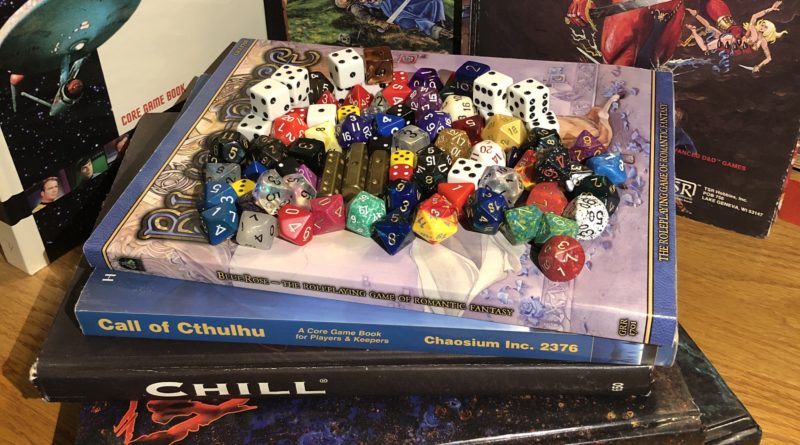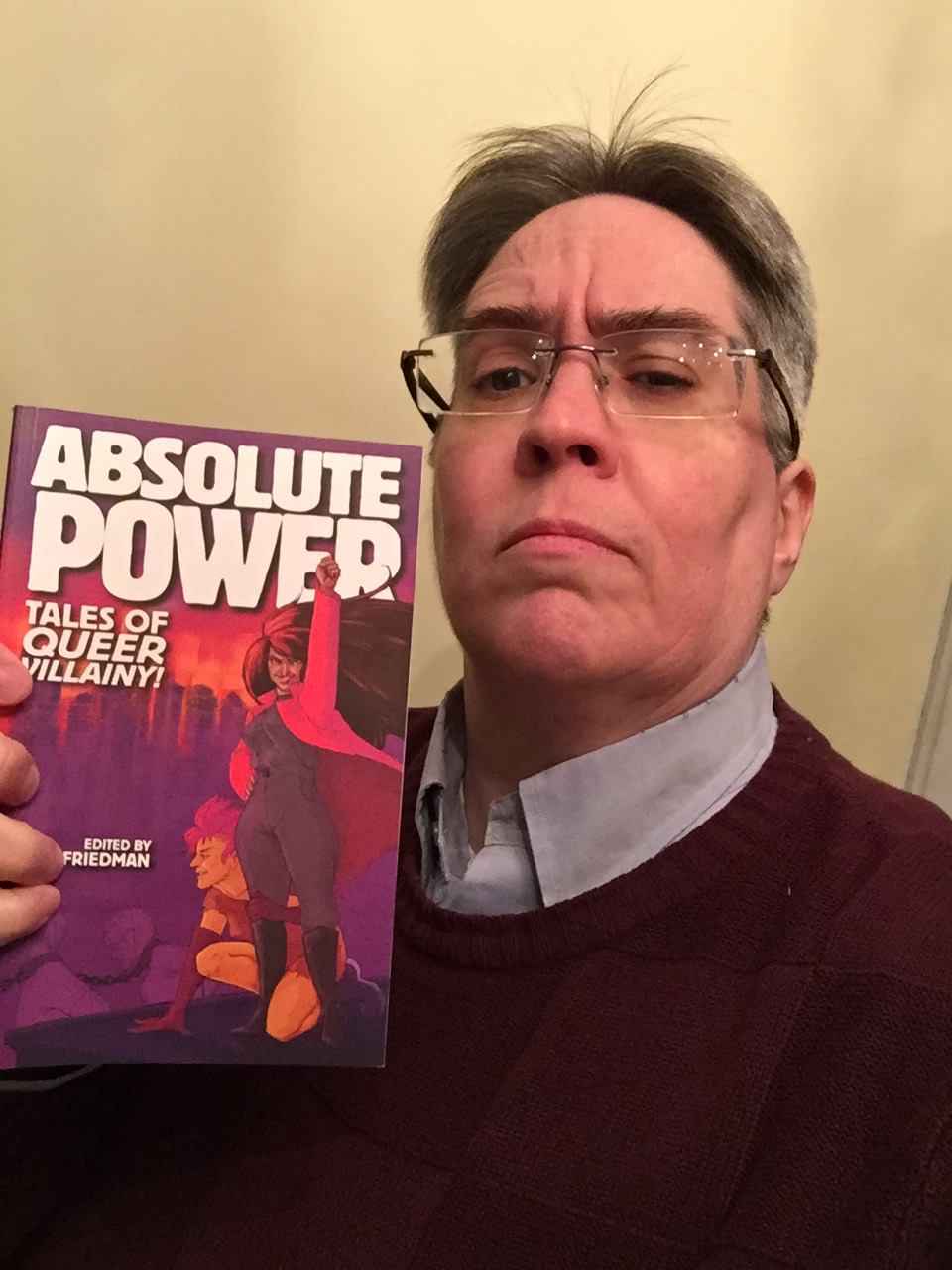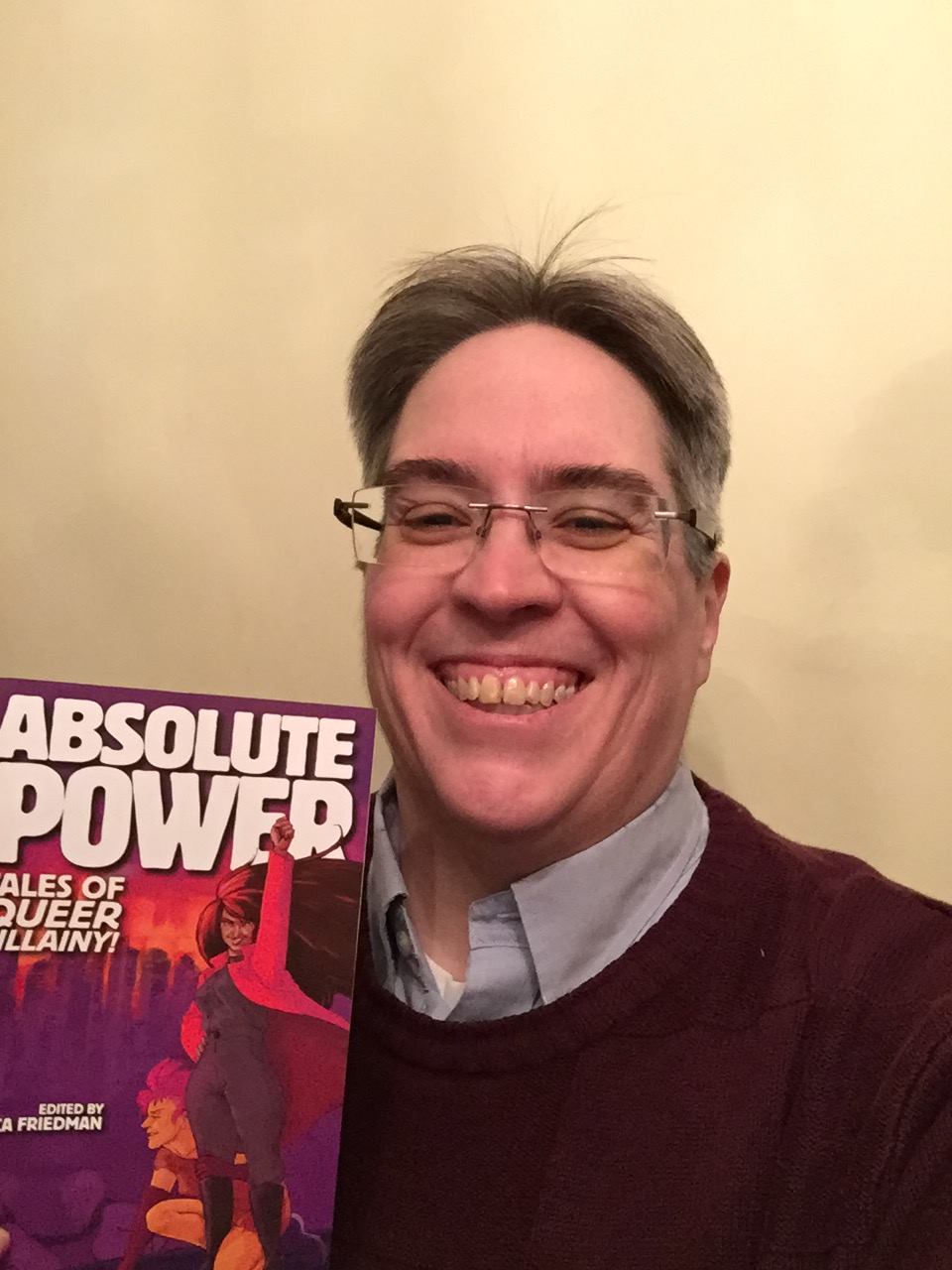(Originally published on March 19, 2021, at the sunsetted GlitterCollective blog.)

Tabletop RPGs have been a major part of my life for a long time now. 40 years? 40 years. I wasn’t one of the very first D&D gamers, but I started damn early, even making up my own game system before I had access to the D&D books. I ran my first games for my next-door neighbors, and went on to run a homebrewed D&D game (based on a novel my best friend and I wrote together) for 2 different gaming groups, tweaking the rules to allow the elf variants we made up and their special powers.
During my grad school and just-post-grad-school years and the abusive relationship that spanned that time, it was easier to worry about the stories than the mechanics, so boughten game systems were the way to go. D&D, Rolemaster, Villains & Vigilantes, Marvel Superheroes, Champions, Chill, and the White Wolf games were all the rage in my gaming group then. I started running a Vampire: the Masquerade game the first week it came out, and continued running Vampire games for 4-5 years after. Werewolf: the Apocalypse didn’t grab me as much (until later GarouMUSHing happened).

Though I wrote for Mage: the Ascension, I didn’t run a game until I got together with my wife and we pulled a gaming group together. The Mage group was based in Philadelphia until we all up stakes and moved to New England. We ran another Mage game once we got relocated, and then I ran some short campaigns. There was a brief D&D game, I think, and a Big Eyes, Small Mouth game, and a couple of very homebrewed one-shots using a generic version of the White Wolf dice system. Other members of the gaming group ran games too, including a fantasy game using my friend’s SF game system, some Ars Magica, and an instance of testing the SF game system and setting. I also created a setting for a MUSH that took the White Wolf game setting and changed it heavily to get rid of the bits I didn’t like.
Our first New England gaming group broke up as some people absconded to New Zealand and we moved out of the city and into the burbs. Tabletop gaming was a little spotty for a few years as a result. We had a mostly-different group of friends who were willing to truck out to our house once a month, so I ran some nostalgia games: a short run of Vampire, a brief first edition D&D game, and a few homebrewed worlds and game systems.
One of these latter games slowly smoldered toward self-combustion over the course of a year. There were a few sources of ignition under the social lid, and we had a series of small blow-ups and player changes before the final explosion that not only ended the game but shattered the gaming group into flinders. The whole experience left me completely burnt out on tabletop RPGs for a long time.
My Relationship With Tabletop RPGs
My relationship with tabletop RPGs was changed and, in some ways, broken. I was unable to run tabletop games for about 5 years after the debacle. Though I now run games, I no longer consider it my “art form”: it’s a hobby. That change makes me sad — at one point this was something I did that was incredibly fulfilling in and of itself. Now it’s primarily a social thing, and any pride I take in a good GMing performance is the kind of pride I get from finding the perfect gift for one of my loved ones. It’s nice, but not the rush it once was.

I think that disaster may have also broken my relationship with games created by game studios. I mean, I was already trending away from them, or modifying them heavily when I did use them. I think the last tabletop RPG I actually bought was Blue Rose. While I was attracted to many (queer! thoughtful!) aspects of it and wanted to support it by buying the books, I still haven’t run a game of it because I ended up bouncing off the mechanics. With other games since then, I find myself cringing when I pull a book off the shelf (even virtually) and see the heteronormativity and whiteness that are rampant throughout them. Once upon a time, I could overlook it, but now? It’s like my relationship with comics and other media; if the queerness isn’t present, I’m just not interested any more.
A lot of my homegrown games are inherently queer the way my favorite fantasy and science fiction novels of the 80s and 90s (and later, of course) often are: the cultures just happen to be queer by default, and I’m much more comfortable running that as a very queer GM for my now-entirely-queer gaming group. My game mechanics are also much more geared toward providing randomization for story purposes than providing “realistic” combat, because I don’t actually much care about combat any more. (Though I’m contemplating creating a dice system that invokes all the things I find fun about dice systems while jettisoning things I don’t enjoy.) My games have become (and perhaps always were) all about the story and the character relationships.
Homebrewed Queer Settings
Victorian Frat Boys

I eventually got a small inspiration and put together a baroque little 5-session game. It took me a year or two to write it and to feel out a small, trusted gaming group for their desire to play it. The game was structured like a theatrical LARP in that I wrote the characters as well as the setting; this was, in part, because most of my players were theatrical LARPers and LARP GMs. I had some fancy name for the campaign but that has been rejected in retellings favor of “Victorian Frat Boys” even though the Victorian frat boys were only one small section of the game. Every session started with the players getting a new version of their characters in a different setting: Victorian horror, D&D, SF psionics, and, uh, angel chestburster apocalypse.
In the final game session, they all woke up to discover that these different worlds were generated as a kind of magical VR experience. They were all actually Royal cousins being tested for which one would be the better member of the Royal Family to inherit the throne, and they had to resolve that situation. My players, being the ridiculous LARPing queers they are, settled on essentially a polyamorous triumvirate. Because of course they did.
Imaginary Realm and Summoning
My wife and I then developed a game loosely based on the Persona videogames, also drawing from the world of the Yami no Matsuei anime. In this version of modern day Earth, mages are people who can transmit their minds consciously into the Imaginary Realm (all humans do that while dreaming, but it takes knowledge and practice to do it while awake). They can make contracts with inhabitants of the Imaginary Realm, which generally allow the mage to summon the imaginary person/concept, either in the Imaginary Realm or the real world, and order them to use their powers. The mage is essentially offering reality in exchange for servitude. The more popular the person/concept, the more infused with “reality” they are and the more power they can provide the mage — and also the more interested they may be in getting more reality.

In our game, the situation got murky very quickly, because our newbie mage characters could only get contracts with fairly minor characters initially, lacking the power to really trade in reality with the more powerful characters. Being friendly and fannish types, the characters chatted up their summons, developing relationships with them that started to bring the whole “servitude” aspect into sharper focus. Can you have a relationship with a being that is bound to obey you? If they start to develop sentience outside their canon, can you bring yourself to terminate a contract with them since it means that that version of them will eventually cease to exist as the reality giving them that sentience leeches away? Can imaginary beings ever have anything approaching free will, since they’re always in service to something, whether it’s their canon, whatever fanon they inhabit, or the mages they contract with?
Meanwhile, the characters were trying to save the world from people who wanted to mash the real world and Imaginary Realm together to “bring back magic.” It was a fun couple of years of game, and we added another person to the gaming group along the course of the first game (they joined while the characters were temporarily trapped in Equestria, so their first appearance in-game was as a My Little Pony). We engineered a big calamitous final boss battle. (Where the “final boss” was a long series of final bosses, some of which they’d fought before, some of which they hadn’t.) After a bit of a break post-first-campaign, we came back around to the setting and characters, added another person to the gaming group, and are running another campaign in the setting with commensurately higher stakes with their “higher level” characters.
The system we cooked up for this game was very loosey-goosey. The characters have no stats, only skills. They also have Head, Heart, and Theme Tarot cards, though we only ever actually ended up using the Heart cards, which are all Major Arcana. For our randomization, we also use Tarot cards — every player has their own mini-Ryder/Waite/Smith deck and the GMs have an extra-large deck. We use the cards for combat, skill checks, perception, anything really. As the GMs, we sometimes use card draws to inform whatever happens next. In combat, a “higher” card usually wins (with majors, we sometimes look at the number on the card), unless it’s reversed. Sometimes we have to get into creative Tarot interpretation. The games are very cinematic and dramatic at times, and we blame the decks for that.

Genderqueer Utopia Versus the World
I also adopted the Tarot system for my other setting, which is high-fantasy where I decided that there weren’t going to be any elves or dwarves, but other human variants created by magical genetic engineering. These variants include materials from other species, and therefore aren’t considered human, so there’s a long history of enslaved peoples in the world. At some point, one individual from one variant started a revolution that ended when that individual fell into a well of liquid magic and transformed into a dragon. After defeating her foes and freeing the enslaved people in that country, she went off to create a mountain-walled country where human variants, particularly people of her variant, could live safely.

In the game I ran, it is 400 years later and characters who were essentially the superheroes of their country were being sent out to run a series of very light espionage training missions in 3 other countries. Light training missions turned into fighting zombies, blowing up mage towers, burning down part of an enemy city, and finding the tomb of their variant’s creator. That was the introductory game in 5 sessions. I have a whole Part 2 planned, but I need my writing brain to come back in order to write the updates to the characters.
I kept the skill list and Heart card concept for this game, but also added a magic system (based loosely on a combination of Ars Magica and World Tree) with skill levels. Given that there’s going to be 3 years between games, I’m letting players rearrange some of their skills and magic to better fit how the characters landed at the end of the first game. Oh, and did I mention that all the members of this variant are a) born in a female shape and b) can shapechange? Genderfluidity and queerness built in. They’re also finding out that the variant designer infused all of them with some inheritable quality taken from fossils of Great Beasts (like Dragons), and this is why their country’s founder transformed into a Dragon.
I’ve also built a version of this world that predates that game by a couple thousand years — before the variants were created, during a time when there were still human families that claimed ancestry from Great Beasts. We haven’t played in it yet, and I’m still poking the worldbuilding. I was thinking of using 1st edition D&D, mostly because I miss playing with dice, but I’m already dissatisfied with that as a magical system. I prefer looser magical systems, because my players are more creative than any of the lists of spells allow them to be. Buuuut if I’m ever going to run the game, doing it in D&D will be the way to get that to happen.
All The Things I Want From Dice
I really like our Tarot system and how narratively helpful it can be for me as a GM. But, being the gamer geek I am, I kind of miss rolling dice. Also, this trend for people to make really fricking spiffy dice is appealing to my sparklegland. Clearly I do not own enough dice yet.
I started thinking about what exactly I enjoy about using dice in games, and came up with a short list:
- Spectacular successes (natural 20)
- Spectacular botches (natural 1)
- Using every type of die I own (including the d12)
- Rolling character stats
- Rolling whole handfuls of dice
Oh, but then it occurred to me that there are some non-dice-related things I like about some system mechanics:
- Filling in bubbles for stats/skills (because I apparently didn’t get enough of this from the SAT/GRE)
- Virtues and flaws
- Spending skill points
- Also maybe skill trees like they have in some videogames (FF10 for instance)?
I might also enjoy randomly generated character background prompts sometimes, but maybe not the books of heteronormative claptrap I remember from the 90s.
So yeah, now I’m trying to figure out how to integrate all these things into a super-lightweight system that I’ve given the working name “Dopamine Dice” (because it’s based on things that give me joy). I had some ideas in the shower a few weeks ago, and promptly forgot to write any of it down! Maybe it will have been brewing in the back of my head all this time and the next time I contemplate it in the shower, it will come out, fully formed as Athena. Sometimes my games do that.


